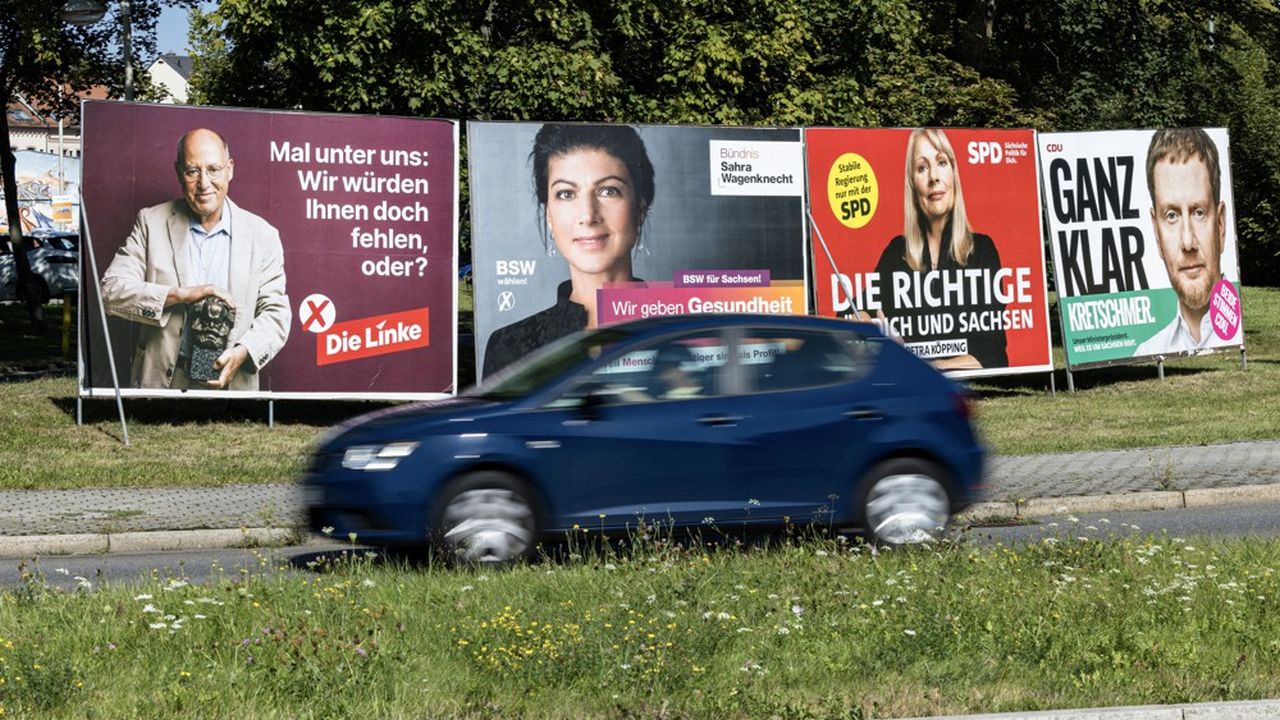
With just over 6 million inhabitants between them, Saxony and Thuringia represent only 7% of the German population. However, the two eastern Länder have rarely been so crisscrossed by foreign journalists. It must be said that the two elections that will take place there this Sunday will have serious consequences on German political life.
First, these elections will mark an increased weakening and fragmentation of the political landscape. According to the latest polls, the far-right party Alternative for Germany (AfD) is credited with around 30% of voting intentions in Thuringia and 32% in Saxony, while the country has just been hit by an attack claimed by the Islamic State.
The Sahra Wagenknecht Alliance, a far-left populist party created at the beginning of the year, obtained 20 and 15% of voting intentions respectively. In other words, a seventh party is asserting itself in the national game!
The three ruling parties will be marginalized. According to the polls, the liberals will not be represented in the regional parliaments and the Greens and the Social Democrats of Chancellor Olaf Scholz will reach at best the 5-6% mark, while the conservatives, in opposition, would win 30% of the vote in Saxony and 21% in Thuringia. While all the other parties have ruled out joining forces with the extreme right, finding a clear majority will be complicated. This will require unprecedented coalitions, for example uniting the right with the Sahra Wagenknecht Alliance.
“Twenty years ago, an alliance between the Christian Democrats and the Greens was unthinkable in Germany. Today, these elections risk taking the country a step further in this regard,” worries Frank Baasner, co-director of the Forum for the Franco-German Future.
Unexpected compromises
Fundamentally, this development risks weakening the system, because the more partners there are in an alliance, the more the parties that make it up are forced into unexpected compromises. In this case, what is the point of a vote, voters wonder. It also risks slowing down initiatives, as shown by the complicated functioning of a three-way coalition in Berlin.
These elections, which mark the rise of the extremes, will also undermine the image of Germany as an island of stability in a Europe gripped by extremism. “For me, this election is a fight against the normalisation of fascism,” explained Thuringia’s Minister-President, Bodo Ramelow, during an exchange with foreign journalists.
Few structures, few activists but the electorate is there
Last but not least, Sunday’s elections will see the emergence of the Sahra Wagenknecht Alliance, a new party that is both pro-Russian and anti-immigrant, based on the popularity of a single person and combining far-left and far-right ideas. “We are dealing here with a form of democratic centralism, where opinion is formed from the top down. This is something totally unusual in German political culture,” says Tilman Mayer, a political scientist at the University of Bonn. This party has few structures or activists, but the electorate is there.
In this game, the parallel with Emmanuel Macron is obvious. Except that the French president had succeeded in this pirouette in the center, while Sahra Wagenknecht takes it to the extremes. The leader goes far in personalization. She is not a candidate in Thuringia or Saxony. But she is on all the party posters. Not the local candidates.
For the parties in the running, these regional elections also present specific challenges. After its disappointing score in the European elections, the AfD is aiming to reach the 33% threshold. This blocking minority would allow it to prevent certain laws from being voted on and to block the renewal and election of judges.
For the Christian Democrats of the CDU, these elections are a test of whether Friedrich Merz’s strategy of rightward shift is effective against the AfD. Once he has passed this hurdle, the leader should see the path to the chancellery open before him, while the parliamentary elections are scheduled for next year. Sahra Wagenknecht’s party could allow the right to bypass the AfD to build a majority in Saxony, but it will not be easy to work with a pro-Russian party.
A survival strategy
The Social Democrats and the Greens are engaged in a survival strategy, in order to pass the 5% threshold and be represented in parliament. In East Germany, the Greens’ positions on issues such as cars or heating are often perceived as attacks on people’s way of life.
After the vote, the Social Democrats will be asking themselves more than ever whether they have a future with Olaf Scholz or not. The alternative would be the Minister of Defense, Boris Pistorius, whose popularity is strong. When the time comes for the legislative elections in 2025, the leader could be an option, even if his desire to strengthen the German army is not unanimous.






